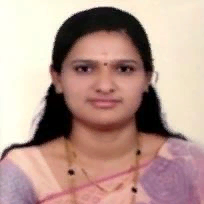
Megha Rani Raigonda
Work place: Department of CSE (MCA), Visvesvaraya Technological University, Centre for PG Studies, Kalaburagi, India
E-mail: megharaigond@rediffmail.com
Website:
Research Interests: Artificial Intelligence, Computational Learning Theory, Image Compression, Image Manipulation, Image Processing
Biography
Megha Rani Raigonda, (Ph.D.), is working as Assistant Professor at the Department of Computer Science and Engineering (MCA), Visvesvaraya Technological University, Center for PG Studies, Kalaburagi, India. Research areas are Machine Learning, Image Processing, and Artificial Intelligence. She has published more than 25 peer-reviewed research articles.
Author Articles
Early Detection of Dementia using Deep Learning and Image Processing
By Basavaraj Mali Patil Megha Rani Raigonda Sudhir Anakal Ambresh Bhadrashetty
DOI: https://doi.org/10.5815/ijem.2023.01.02, Pub. Date: 8 Feb. 2023
Dementia is the world's most deadly disease. A degenerative disorder that affects the thinking, memory, and communication abilities of the human brain. According to World Health Organization, more than 40 million people worldwide suffer from this illness. One of the most common methods for analyzing the human brain, including detecting dementia, is using MRI (Magnetic resonance imaging) data, which provides insight into the inner working of the human body. Using MRI images a deep Convolution neural network was designed to detect dementia, we are utilizing image processing to help doctors detect diseases and make decisions on observation, in an earlier stage of the disease. In this paper, we are going to get to the bottom of the DenseNet-169 model, to detect Dementia. There are approximately 6000 brain MRI images in the database for which the DenseNet-169 model has been used for classification purposes. It is a Convolution Neural Network (CNN) model that classifies Non-Dementia, Mild Dementia, Severe Dementia, and Moderate Dementia. The denseNet-169 model helps us determine Dementia disease. And also present the 97% accuracy for clarification of disease is present in the patient body. we are conducted this survey for providing effective disease prediction model for physicians to conclude that the disease stage is accurate and provide proper treatment for that.
[...] Read more.Other Articles
Subscribe to receive issue release notifications and newsletters from MECS Press journals